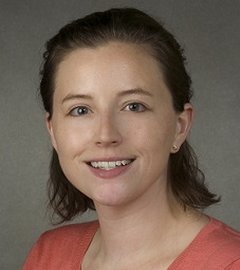College of Liberal Arts & Sciences
Professor Margaret Carrel Named 2019 Andrew Carnegie Fellow
Congratulations to Margaret Carrel, associate professor geographical and sustainability sciences, on being named a 2019 Andrew Carnegie Fellow!
Carrel is one of 32 recipients of the 2019 class of fellows who will receive a grant of up to $200,000 to research, write, and publish in the humanities and social sciences. Carrel’s project is titled “Understanding Infectious Disease Risk in the Wake of Hurricanes and Floods in the U.S.” The $200,000 grant will support her work and that of two other faculty members and a graduate student.
Read more here: https://www.carnegie.org/awards/andrew-carnegie-fellows/2019/
Below is the full Iowa Now feature:
Margaret Carrel, associate professor of geographical and sustainability sciences at the University of Iowa, is one of 32 winners of a prestigious Andrew Carnegie Fellowship. Each recipient in the 2019 class of fellows will receive a grant of up to $200,000 to research, write, and publish in the humanities and social sciences.
Carrel’s project is titled “Understanding Infectious Disease Risk in the Wake of Hurricanes and Floods in the U.S.” The $200,000 grant will support her work and that of two other faculty members and a graduate student.
“This award is a huge honor and an indicator that the questions we are seeking to answer are important to public health in the U.S.,” says Carrel. “The award gives me time and resources, in addition to those provided by the university, to do high quality research with colleagues and graduate students and to bring this information into the classroom. My teaching interests are in spatial epidemiology and the human and environmental health implications of food, so this work perfectly dovetails with topics I engage in discussions about with undergraduates.”
Carrel says the project will use data on health outcomes of U.S. veterans in combination with data on flood and hurricane exposure to assess if and how bacterial and viral infection rates change during or after disasters. The project also will look at the locations of industrial livestock production to see if potential exposure to flooded hog, cattle, or poultry facilities increases cases of infections, particularly those that are drug resistant.
“There’s a lot of concern on the part of the general public about how health outcomes change when people are exposed to contaminated floodwaters, but until now we’ve had no real way to assess this,” she says. “I hope we are able to determine when and how exposure to floods and hurricanes impacts disease outcomes, and that these results inform public health preparedness and response to disasters.”
The Carnegie Fellowship program has provided $32 million in grants to more than 160 fellows since 2015. Its overall objective is to offer fresh perspectives on the humanities and solutions to the urgent issues of today. Fellows are chosen by a panel of jurors that makes selections based on the quality, originality, and potential impact of their proposals, as well as the scholar’s capacity to communicate the findings to a broad audience.
For the project, Carrel says she will use detailed medical histories from veterans about the types of infections they experience, as well as where they live. She and her team will combine this information with high-resolution disaster impact maps that will allow them to explore what, if any, changes in health patterns occur in disaster-exposed populations.
“If there is increased risk associated with flooded or otherwise compromised livestock operations, then this could also potentially inform policy about how animals and their manure are protected and contained during disasters,” she says.
Carrel, who came to the UI in 2011, says she has received strong support for her ideas and scholarship.
“I have found Iowa to be a very welcoming environment to junior scholars with diverse research agendas that require interdisciplinary research teams,” she says.
The UI is one of few universities in the U.S. with both geography and public health programs, which is what attracted her to campus. Once here, she has found a spirit of strong collaboration with colleagues on research in drug resistant bacteria and vulnerability and resilience to natural disasters.
“If I wasn’t here and hadn’t met these collaborators, then this research would not be possible, but also would never have occurred to me,” she says. “The partnerships I have developed at Iowa led to this new research direction.”
Additionally, Carrel says, she has strong family ties to the UI. Her great-grandfather and great-great-grandfather are alumni of both the College of Liberal Arts and Sciences and the Carver College of Medicine.
“Returning to the university and Iowa City felt like a natural path,” she says.
While working on this project, Carrel will continue to teach both undergraduate and graduate courses, as well as mentor students on their own projects.
